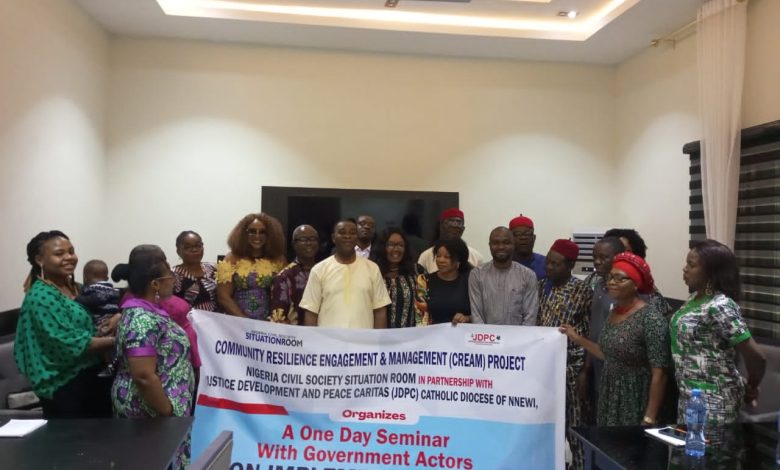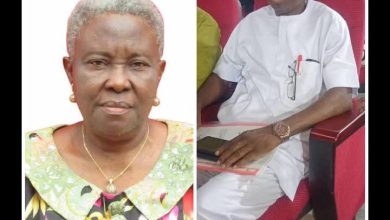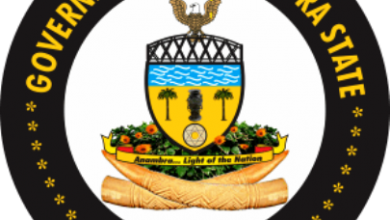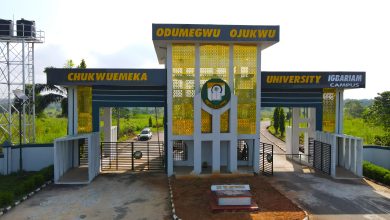
Stakeholders in health and education sectors in Anambra State have promised to partner the state government to ensure that all laws and policies governing the sectors are effectively implemented to deliver intended benefits to the citizens.
The people gave the assurance in Awka during a one day seminar on health and education laws organized by the Nigeria Civil Society Situation Room in partnership with Justice Development and Peace Caritas (JDPC) Catholic Diocese of Nnewi.
The event, which held under the Community Resilience Engagement and Management CREAM project, drew participants from the ministries of education and health as well as agencies under them, who interacted with members of the civil society, Community Empowerment Network, and media on how the state can derive greater benefits from existing laws and policies in the two critical sectors.
Addressing the participants, the Director, JDPC, Nnewi, Rev Father Ben Okolo, charged them to objectively assess laws and policies governing the two sectors and come up with suggestions on how best to implement them to better the lots of the people.
“We bring you here to objectively look at education and health laws and policies of Anambra State to see what is right or wrong. This is not to run down the government but to help it to better serve our people.
“I beg all of you to open your minds and be frank so we can work with the government in the best ways to improve our health and education sectors”.
A member of the Nigeria Civil Society Situation Room, Ugochi Ehiahuruike, pledged continuous support to JDPC Nnewi even as she stressed the need for the Ministries, Departments, and Agencies, MDAs, to see the civil society activists as partners in progress.
“The focus of your intervention is a very good one. So, situation room will continue to partner to make sure that is achieved.
Shedding light on the goal of the CREAM Project, a member of the CREAM project team, Samuel Ololo, explained it was necessitated by the fact that education and health rank high among the challenges facing the people of the state.
“We have selected two local governments in each senatorial district to pilot the project while we are executing it in two communities in each of the LGAs. After now, we shall engage with relevant MDAs.
“Our concern is to see impacts of government activities and programmes in these two sectors on the people. In everything, we also have consideration for persons with disabilities especially those who have not started going to school,” Ololo said.
The Director, Disease Control and Immunization at the Anambra State Primary Health Care Development Agency, Dr Placid Uliagbafusi, promised the readiness of the agency to support the goal and objectives of the CREAM project in the primary health sector.
“Government has recruited some health workers and more will still be recruited. We are ready to work with you to achieve your aim. Just let us know how to come in and we shall be willing to support this lofty project”.
For his part, the Executive Secretary, Anambra State Health Insurance Agency, ASHIA, Dr Simeon Onyemaechi, who was represented by a nurse in the agency, Nbonu Ogochukwu, regretted that thousands of indigent citizens of the state still do out of pocket medical expenses which negatively impact them especially given the current harsh economic realities in the country.
“JDPC can also come in by way of enrolling some of these indigent persons to be able to access health care services at any time. For these people, 12,500 naira premium for a year is still too much. They can’t access medical care for lack of money. They will be happy to get access to such. When all get enroll in the scheme, universal health coverage will be attained.
Representatives of Anambra State Universal Basic Education Board, ASUBEB, Dr Uchenna Ezeani, and Mrs Ogochukwu Emeka-Arinze, of the Post Primary School Service Commission, PPSSC, commended the free education policy of the current administration which had lifted the burden upon many indigent parents.
They however believed the implementation is a work in progress which must be improved upon as issues and challenges arise.
The chairman, Anambra State Community Empowerment Network, Chief Godwin Eze, pledged the readiness of the network to partner government for speedy progress across all the communities. “We are the community members. We will praise you when you do well and call you to order where it is necessary”.
Other members including Mr Albert Chinwuko from Urum, Mrs Jane Adibe from Ozubulu expressed worry at the current state of some primary health centres across the state and the confusion which the new nomenclatures given to government and mission schools have caused in various communities.
“I must tell you that it is causing confusion in many communities. Tell Mr Governor to look into it,” Adibe said while Chinwuko called for greater attention to infrastructure in public health centres across the state. “Some of them operate in old, dilapidated building with leaking roofs. Some have only one nurse, no medicine. They buy drugs. We need Government to do more”.
The Director, National Population Commission, Dr Joachin Ulasi, while regretting that most Nigerians do not understand the essence of some government policies, stressed the need to take implementation of such policies to the grassroots.
“For instance, one of our key functions is registration of births and deaths. We don’t care about the birth certificate of the child. The aspect of birth is very important. I don’t even want to go into death certificates. People hardly think about it”.
Speaking on behalf of persons with disabilities, Mrs Gloria Nwafor called on the government to be intentional in alleviating the plights of their members.
“We are in different categories needing different attentions and help. Government needs to accommodate our educational and health needs. Government policies must be sold to them not minding their peculiar challenges.
“We are part of this society and we must be treated as such. We are human beings. Make public infrastructure accessible to us,” Nwafor solicited.




